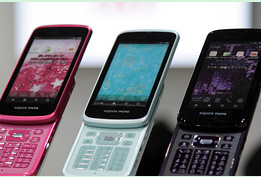(单词翻译:单击)

By 2006, a year before Apple introduced the iPhone, Japanese consumers could watch broadcast TV on their phones.
到2006年,就在苹果公司推出iPhone的前一年,日本消费者已经能够通过手机观看电视节目。
Yet, for all the advances, Japanese manufacturers struggled to challenge Finland's Nokia Corp. and U.S.-based Motorola Inc. abroad because the Japanese firms had churned out phones for the domestic market throughout the late 1990s and early 2000s based on a telecommunications standard used only in Japan. In order to sell phones abroad, the companies had to modify the handsets to work on foreign networks.
尽管技术上进步惊人,日本厂商在海外市场却难以对芬兰诺基亚(Nokia Corp.)和美国摩托罗拉(Motorola Inc.)形成挑战,因为从90年代末到本世纪初的这段时间,日本厂商都是根据仅适用于日本的通讯标准制造手机,以满足国内市场的需求。为了在海外销售手机,日本厂商必须对手机进行改装以适应海外市场的通讯网络。
Late to the market, Japanese manufacturers struggled to gain a foothold with foreign carriers, unlike South Korea's Samsung, which forged relationships with network operators around the world and worked quickly to supply products tailored to overseas markets.
由于产品在海外上市的时间晚,日本厂商很难像韩国的三星那样与海外电信运营商建立稳固的合作关系。三星与各国的电信网络运营商建立了良好关系,并致力于迅速推出专门针对海外市场的产品。
The inward-looking mentality earned Japan's devices the moniker, 'Galapagos' phones: a reference to the uniquely evolved creatures that Charles Darwin found on the Galapagos Islands that served as the foundation for his theory of evolution.
由于重点关注国内市场,日本手机赢得了"加拉巴哥"(Galapagos)手机的称号,将日本手机比作达尔文(Charles Darwin)在加拉巴哥岛上发现的独特进化的生物。据说正是在加拉巴哥岛上的发现为达尔文的进化论奠定了基础。
The most popular Japanese feature phones were often long, skinny versions of clamshell-type phones. They came with a host of features unique to the Japanese market such as digital money to make purchases, the ability to double as a monthly pass for trains and buses or a function to swap contact details with a push of a button.
最好卖的日本功能手机往往都是狭长、轻薄的翻盖机型,而且带有专门针对日本市场的很多功能,比如内置可支持刷卡购物的数码芯片,还可以升级为带有公交卡的功能,或者能够一键交换联系方式。
The iPhone's debut in 2007 changed everything.
2007年iPhone的面世改变了一切。
While the rest of the world saw the iPhone for what it was - a game-changing product - some executives in Japan dismissed it, believing their phones were already smart enough.
虽然全世界意识到了iPhone对于整个行业的意义──它是一款具有决定性的产品,然而日本的一些高管却忽视了它,固执地相信自家的手机已经足够智能了。
In July 2008, a few weeks after Softbank Corp. introduced the iPhone in Japan, Tadashi Onodera, chief executive of Japan's No. 2 carrier, KDDI Corp., said the device couldn't 'fully satisfy the needs of [Japanese] cellphone users.' Three years later, KDDI, under new management, began to offer the iPhone and it became KDDI's best-selling smartphone.
2008年7月,软库公司(Softbank Corp.)将iPhone手机引入日本几周后,日本第二大运营商KDDI Corp.的首席执行长小野寺正(Tadashi Onodera)声称,iPhone无法完全满足日本手机用户的需求。三年后,更换了管理层的KDDI开始销售iPhone手机,后来iPhone手机成为这家公司最畅销的智能手机。
'The Japanese firms misread the market,' said Ryuji Ono, a Tokyo-based partner at consulting firm Roland Berger. 'They weren't watching the rest of the world.'
咨询公司罗兰贝格(Roland Berger)驻东京的合伙人大野隆司(Ryuji Ono)说,日本公司错判了市场,没有留意整个国际舞台。
Smartphones now account for 56.6% of all new mobile phones shipped in Japan, according to Tokyo-based market research firm MM Research Institute. Apple and Samsung accounted for more than 20% of the Japanese market in the past fiscal year, compared with five years ago, when there were almost no foreign brands.
根据东京市场调研公司MM Research Institute的数据,现在,智能手机已经占到日本新手机出货量的56.6%。在过去一个财政年度,苹果和三星在日本市场占据了逾20%的份额。而就在五年前,日本手机市场上几乎还没有外国品牌的身影。
Apple was the top smartphone manufacturer in Japan in the past fiscal year. And Samsung cracked the top five in the domestic smartphone market.
上个财年,苹果是日本第一大智能手机品牌,三星也跻身前五强。
By the time Japanese manufacturers jumped on the trend - the first Japanese smartphones running Google Inc.'s Android operating system appeared in the domestic market in 2010 - Samsung was already flooding the Europe and the U.S. with a wide range of models.
等到日本厂商试图赶上这股智能手机潮流时(第一批运行谷歌安卓(Android)操作系统的日本品牌智能手机2010年才在日本国内市场推出),,三星已经在欧美市场推出了众多机型。
Backed into a corner in their own country, the leading handset makers have had no choice but to consolidate and re-enter foreign markets.
在自己国内几乎陷入绝境的日本领先手机制造商们别无选择,只能携手合作,重新打入海外市场。
NEC Corp., Hitachi Ltd., and Casio Computer Co. in 2010 joined forces to form a cellphone joint venture majority owned by NEC. Later that year, Toshiba Corp. sold its phone business to Fujitsu. In February, Sony bought out its joint-venture partner, Sweden's Telefon AB L.M. Ericsson, giving the Japanese company full control over its money-losing smartphone business.
2010年,日本电气公司(NEC Corp.)、日立(Hitachi Ltd.)和卡西欧(Casio Computer Co.)组建了一家手机合资公司,日本电气担当大股东。是年晚些时候,东芝(Toshiba Corp.)将手机业务出售给了富士通。今年2月,索尼从瑞典爱立信公司(Telefon AB L.M. Ericsson)手中收购了合资公司的全部股权,对处于亏损状态的智能手机业务有了绝对的控制权。
But times remain tough. In the most-recent quarter, Fujitsu, NEC, Sharp, Sony and Panasonic all reported losses in their handset business segments.
但形势依然严峻。最近一个季度,富士通、日本电气、夏普、索尼和松下的手机业务均告亏损。
What's more, Sony, Panasonic and Sharp are backing away from the TV business, unable to withstand another round of competition with already battered balance sheets.
而且,索尼、松下和夏普均逐渐弱化了电视机业务,已经不堪重负的资产负债表很难经受起新一轮的竞争。
The television television stelevisiond so essential to an electronics company's success that it was deemed 'the king of the living room.' 'The golden age of TV is over, and TV will never be king again in the consumer-electronics space,' Kunio Nakamura, a former president and chairman at Panasonic, said in an interview last month with the Nikkei newspaper.
松下前总裁兼董事长中村邦夫(Kunio Nakamura)上个月接受《日经新闻》(Nikkei)采访时说,"电视机的黄金时代已经过去,电视机永远也无法在电子消费市场称王称霸了。"
Panasonic recently came to Europe with a new waterproof smartphone called the Eluga, selling it in Italy and Germany with a target to ship 1.5 million units in Europe this fiscal year.
松下最近在欧洲市场(意大利和德国)推出了一款新型防水智能手机"Eluga",目标是本财政年度在欧洲的出货量达到150万部。
NEC Casio, which sells shock-resistant G'zOne handsets through Verizon Wireless in the U.S., plans to ship about two million phones outside Japan this fiscal year, or about 40% of its total target of five million units.
NEC Casio通过运营商在美国销售防震手机"G'zOne",计划本财政年度海外市场出货量达到200万部左右,约占其财年总出货量目标500万部的40%。
Sharp is focusing on the Chinese market, though the company doesn't specify how many of its targeted 7.7 million handset shipments will go outside Japan. Fujitsu, meanwhile, aims to reach a deal with an overseas carrier later this year.
夏普则更专注于中国市场,不过该公司未具体说明其770万部的总出货量目标中有多少将在海外销售。同时,富士通正努力在今年晚些时候与一家海外运营商达成合作协议。
For Sony, the bulk of its phones are sold outside Japan. With a flurry of new models this fiscal year, Sony plans to ship 34 million smartphones world-wide, surpassing the targeted output of its four closest Japanese rivals combined.
索尼的手机产品有很大一部分在海外销售。本财政年度,随着一系列新机型的推出,索尼计划在全球销售3,400万部智能手机,超出其四家本国同行目标出货量的总和。
In a sign of the changing attitudes, NTT DoCoMo Inc. President Kaoru Kato arrived at an interview with a reporter last month carrying a Samsung Galaxy phone.
NTT DoCoMo Inc.总裁加藤薰(Kaoru Kato)上个月在一次接受采访时随身携带的是一部三星Galaxy手机,这在无形中也透露出日企高管的态度转变。
It would have been unthinkable even three years ago for the president of Japan's largest carrier and the mobile arm of NTT Corp., which is one-third owned by the Japanese government, to carry a Korean phone.
NTT DoCoMo Inc.是日本第一大运营商,也是NTT Corp.的移动子公司,而NTT Corp.由政府持有三分之一的股权。就算是短短三年前,这样一家公司的总裁带着一部韩国品牌的手机亮相简直令人难以想象。
Mr. Kato says he uses the Galaxy because it was the first available summer smartphone model running on DoCoMo's 4G networks. He says he may switch to a Fujitsu or Sony model eventually.
加藤薰说,他使用三星Galaxy手机的原因在于,它是今年夏季最先推出的使用DoCoMo 4G网络的智能手机。他说,最终他可能还是会换成富士通或索尼手机。
'I'm not trying to be a pitch man for Samsung all of a sudden, but it has a nice, clear screen,' Mr. Kato says. 'Everything is really improved.'
他说,"我并不是突然间变成了三星手机的推销员,但这款手机的屏幕确实很漂亮、很清楚。各方面都真正得到了改进。"


